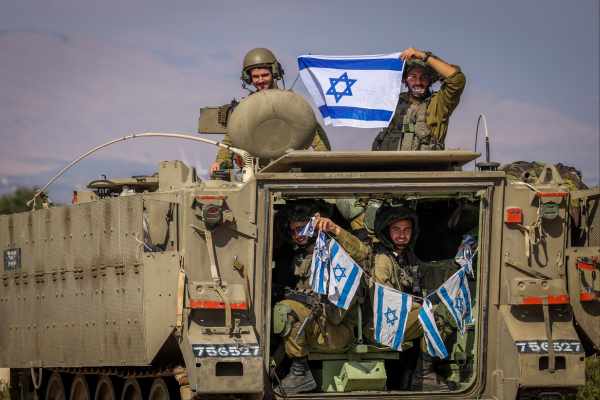Hezbollah missile attacks have resulted in some 20 deaths of Israeli civilians and soldiers.
By Batya Jerenberg
Israel is giving Hezbollah ten more days to move away from its border and then its military will significantly escalate its reactions to the terrorists’ rain of rockets on northern Israel, The Washington Post reported Friday.
Although the end-of-January deadline isn’t absolute, according to officials cited by the paper, the Israelis have told the Biden administration that the window for negotiating a deal is closing fast.
In reaction to the Post’s inquiry, Lior Haiat, a foreign ministry spokesman, repeated Jerusalem’s oft-stated position: “We prefer a diplomatic solution, and if a diplomatic solution will not be possible, we will have to act on our own.”
The Lebanese terror group has been launching rockets and anti-tank missiles almost every day since Israel declared war on its Hamas colleagues in the Gaza Strip following their October 7, 2023 invasion of communities in the south in which they massacred 1,200 people and kidnapped 250, including infants and the elderly. These airborne attacks have resulted in some 20 deaths of Israeli civilians and soldiers.
Hezbollah’s support has also included many attempted infiltrations on the ground and by UAVs through the air – four of the latter on Saturday alone – all of which IDF troops have foiled.
The IDF has said that it is prepared for a much larger-scale attack on Hezbollah than the airstrikes and artillery shelling on its launch sites and command posts that it has so far used to retaliate.
“I don’t know when the war in the north will happen, but the likelihood that it will happen in the upcoming months is higher than before,” Chief of Staff Herzi Halevi told soldiers on the northern front Wednesday. “When we have to, we will go forward with all our strength.”
As a result of the Hezbollah attacks, soon after the war began, the government evacuated over 80,000 Israelis from their homes to guest houses and hotels further south. As Jerusalem has noted, no country would accept this untenable situation that massive numbers of citizens cannot live in their own communities and lose their livelihoods due to terrorism, or that those who do remain are under constant threat of their lives.
The United States has been working very hard on the diplomatic end to keep the war to one front, fearing that an escalation with Hezbollah could instigate a wider regional conflict.
One of the Lebanese sources told the American paper that if Israel attacked, “All resistance organizations in the region are going to join this war,” referring to Iranian proxies such as terror groups in Syria and Iraq who are already targeting American bases in protest of Washington’s support for Israel, and the Houthis in Yemen who have launched dozens of missiles both at Israel and ships in international shipping lanes, which mostly American naval forces have shot down.
According to a Thursday report in the Financial Times, top negotiator Amos Hochstein, who met with Lebanese interim prime minister Najib Mikati last week, brought up the idea of a temporary truce, and via another channel, Washington offered an international economic aid package to Beirut if it would restrain Hezbollah, which is an official part of the Lebanese government.
Lebanon is suffering from a severe financial and political crisis, having only an interim government in place and trying to grapple with triple-digit inflation. Many officials acknowledge that war is the last thing the country can afford, but Iran-backed Hezbollah is generally considered more powerful than the state, with its forces far more lethal than the national army.
Israel has been pushing for Beirut to finally implement the internationally-binding UN Security Council Resolution 1701 that ended the 2006 Second Lebanon War. It calls for the Hezbollah’s disarmament, pushing it back to beyond the Litani River, and its replacement in southern Lebanon with Lebanese Army troops and UN peace-keeping forces. Hochstein also reportedly brought this up in his conversations in Lebanon.
MAKE THE LAND OF ISRAEL EVEN MORE BEAUTIFUL!
PLANT YOUR VERY OWN FRUIT TREES IN ISRAEL!
Farmers near the Gaza border lost family, friends and workers. Spring is here, and they desperately need help to replant the farms. Join us in blessing the People and Land of Israel.
“I will ordain My blessing for you…” (Leviticus 25:4)
